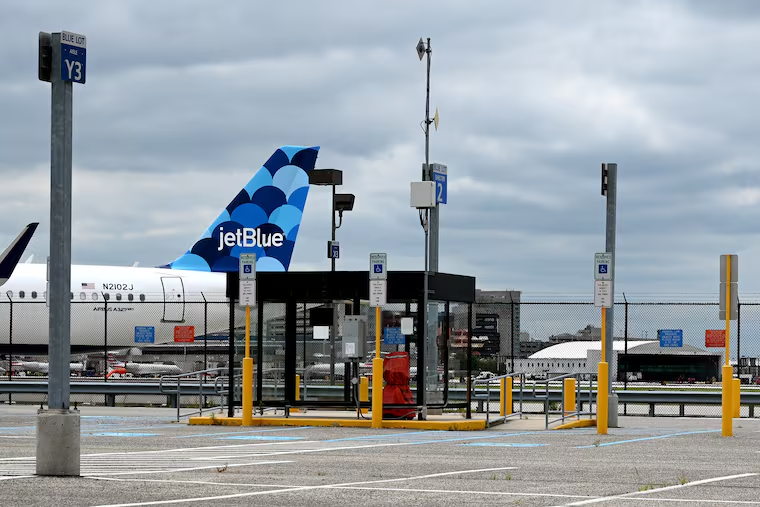Philadelphia’s airport isn’t going to reopen economy parking
Holiday travelers will have to plan in advance. The economy lot with 7,100 spaces is destined for redevelopment as PHL plans to expand cargo operations, an airport official confirmed.

At Philadelphia International Airport, the economy parking lot, shuttered since the start of the pandemic, will not reopen to passengers. Instead, the airport plans to develop the property as part of a multi-year effort to expand cargo services and win more shipping business, a PHL official confirmed Thursday.
“This real estate will serve to support phase one of our cargo redevelopment program,” PHL chief revenue officer James Tyrrell said in an interview. The 40-acre parcel will be a “critical piece for us being able to start that program.”
Heading into the busy period of Thanksgiving travel, the airport is urging passengers to use alternatives — such as riding SEPTA or taking Uber and Lyft. Travelers who insist on driving themselves should arrive three hours in advance of their flight to find a parking space, Tyrrell said.
And the decision to keep the economy lot closed means that PHL passengers will have to adjust their expectations about parking availability for the long term.
“With any kind of growth comes challenges,” Tyrrell said. “People are just used to having that available to them.”
The economy lot — which has 7,100 spaces — has been closed since March 2020, to the frustration of some travelers who have had trouble finding spots in the garages. The closure of a nearby private long-term lot, sold in a $45 million deal this past summer for warehouse development, added to the crunch.
Andy Wlazewski, who is 30 and lives in North Wales, flies for work twice a week from PHL. Parking has only gotten tighter this year, he said. Pre-pandemic, he had a go-to space near Terminal C, or what he called his “frequent flyer parking spot.”
“Now I’m scavenging terminals twice a week just to be able to find one spot,” Wlazewski said. The time and effort of finding parking can be frustrating for frequent and casual flyers alike, he said. As officials make development plans, Wlazewski said, they should also be mindful of the customers paying to fly and who help keep the airport in business.
About 12,000 spots are available to travelers in airport parking garages. Tyrrell estimates that nearly 9,000 or so spaces are available at private lots near PHL.
PHL expects 400,000 outbound passengers over the Thanksgiving holiday, from Nov. 19 to Nov. 30.
“It’s a definite uptick compared to what the airport has been experiencing lately,” Tyrrell said. But overall, passenger traffic remains 30% down compared with 2019 levels.
Reopening the economy lot just for the holidays is not an option, Tyrrell said, citing the costs and logistics of restarting frequent shuttle service.
Pre-pandemic, shuttle service to and from the lot cost the airport about $10 million a year, he said.
“It is absolutely impossible for us to get the economy lot opened in time for the holidays, even if we wanted to,” Tyrrell said.
Passengers can check out the airport’s online guide to public and ground transportation options.
For one thing, PHL shares bookings data with SEPTA so the transit system can adjust capacity, Tyrrell said. He touted the R1 regional rail line, which runs every half-hour between Center City and PHL.
Aside from ordering an Uber, Lyft, or taxi, “it’s always great to have a family member or friend drop you off,” Tyrrell said.
The cheapest daily rate onsite at PHL is $16 when parking for 72 hours or more. When it was open, the economy lot cost $13 per day.
The fate of the economy lot, meanwhile, now appears to be tied to the cargo redevelopment program that PHL announced earlier this year.
“There is a higher and better use for that real estate,” Tyrrell said.
The plans PHL unveiled in June call for one million square feet of cargo facilities development over the next five to 10 years. Officials have estimated that new cargo operations could generate $1 billion in annual economic impact.